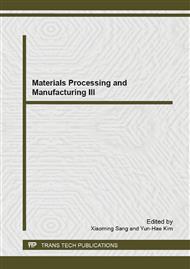p.2590
p.2594
p.2598
p.2602
p.2607
p.2612
p.2616
p.2621
p.2628
PID Control of Hybrid Injection Molding Machine Temperature
Abstract:
This article analyzing the importance of PID in the design of the temperature process controller for hybrid injection mould machine. The injection mould machine is a basic requirement of plastic. Its process to mould the items through adjustment of proper temperatures realized desired shapes. And it is very indispensable to maintain these desired temperatures. PID controller is used as an industrial process controller. It may not get satisfying results when used as a temperature process controller. The temperature process has the characteristics of non-linearity, large inertia and time variations. To solve these problems, this article put forward an effective controller design by introducing PID in the designing of temperature process controller. The paper drafted the performance analysis of PID controller versus based controller designs.
Info:
Periodical:
Pages:
2607-2611
Citation:
Online since:
August 2013
Authors:
Keywords:
Price:
Сopyright:
© 2013 Trans Tech Publications Ltd. All Rights Reserved
Share:
Citation:


